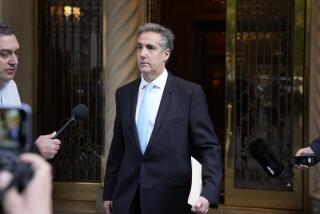Candid phone call may play crucial role in Stevens’ trial
- Share via
WASHINGTON — The telephone conversation between the two businessmen concerned an old friend, Sen. Ted Stevens of Alaska, and the subject was money -- or at least Stevens’ feelings about it.
“Ted gets hysterical when he has to spend his own money,” said one of the callers.
“I know,” replied the other.
In a corruption case where the core issue is whether Stevens knowingly accepted gifts in violation of federal law, the conversation, secretly recorded by federal investigators, could be crucial evidence.
On one end was a restaurateur who oversaw the remodeling of Stevens’ Alaska home. Prosecutors contend the senator never paid for the improvements. On the other end was an oil executive accused of helping bankroll the home makeover and showering Stevens and his family with other gifts in violation of federal law.
The recording is part of the evidence that prosecutors hope jurors will hear as Stevens goes to trial this week in federal court in Washington. Jury selection began Monday.
The Senate’s longest-serving Republican was indicted in July on charges of failing to disclose in financial reports $250,000 in improvements at his home in Girdwood, Alaska, and other gifts, including a Viking gas grill and a bargain price on a new Land Rover.
Stevens, 84, has said that he never intentionally violated the Senate reporting requirement and that in the case of the home improvements, he paid every invoice he ever received.
Beyond questions of guilt or innocence, the trial could open a window onto the backroom dealings and politics of a state that has come under scrutiny since Sen. John McCain selected its virtually unknown governor, Sarah Palin, as his running mate.
The verdict could also decide Stevens’ political future. He sought a speedy trial so it would be over before Alaskans vote Nov. 4 on his bid for a seventh term. The senator remains popular; he easily defeated six challengers in last month’s GOP primary despite his indictment a month before.
But polls show his race against Democrat Mark Begich, the mayor of Anchorage, to be far closer, and he will likely be sitting in a courtroom while Begich campaigns. Perhaps hoping to free up some time for electioneering, his lawyers, citing a need for Stevens “to fulfill his Senate duties,” asked Monday that he be excused from a rule requiring a defendant’s presence every day a federal trial is in session.
Prosecutors hope to show that Stevens regularly received gifts and other considerations without adequate disclosure, and that his actions in failing to report the improvements on his home were neither isolated nor innocent events.
The government has signaled, for example, that it intends to show how Stevens made a questionable $100,000 six-month profit in 2001 in a Florida condo deal in which he put up just $5,000. Prosecutors may also raise whether he failed to properly disclose receipt of a $29,000 bronzed sculpture of migrating salmon that they say has been sitting on the front porch of his Girdwood home.
Stevens’ lawyers have objected, arguing that such evidence, which was not part of the indictment, is prejudicial.
Daniel Richman, a professor at Columbia University’s law school, said that although it may seem unfair to force a defendant to explain such actions, federal evidence rules are more liberal when the defense is based on lack of criminal intent, as is the case here.
The rules permit courts to “expand the frame of evidence . . . to get a better sense of what was going through his head,” Richman said.
So far, U.S. District Judge Emmet G. Sullivan has sided with prosecutors in pretrial rulings on such issues, although he has deferred action on some of their requests.
The bulk of the gifts in question came from a now-defunct oil services company, VECO Corp., and its former chief executive, Bill J. Allen, prosecutors contend. VECO employees led the renovation of the senator’s home, and invoices for the work were processed through Allen before being sent to Stevens.
Allen pleaded guilty last year to providing more than $400,000 in corrupt payments to Alaska state officials. He has been cooperating with federal authorities and is expected to be the prosecution’s star witness.
Stevens’ lawyers are expected to attack Allen’s credibility on a number of grounds. Among other things, they have subpoenaed his medical records from a 2001 motorcycle accident in an attempt to determine whether the crash, which caused head injuries, affected his memory. They have also asked for records of a 2004 investigation into an accusation -- which Allen denies and for which he was never charged -- that he had sex with an underage girl in the 1990s.
Jurors may also hear from Robert Persons, owner of a Girdwood restaurant and a longtime friend of Stevens and his wife, Catherine. Persons reportedly filed the city permits for the remodeling of Stevens’ home and monitored the project’s progress when the couple was not around.
It was Persons who was recorded telling Allen that spending his own money made Stevens hysterical.
At a hearing Thursday, prosecutors said jurors should hear that conversation because it was evidence that the men were engaged in a joint enterprise to enrich Stevens. Stevens’ lawyers objected, saying the talk pertained to an unrelated racehorse syndicate in which the three were investors.
Sullivan did not immediately rule.
--
More to Read
Sign up for Essential California
The most important California stories and recommendations in your inbox every morning.
You may occasionally receive promotional content from the Los Angeles Times.










